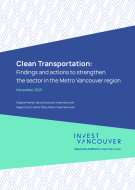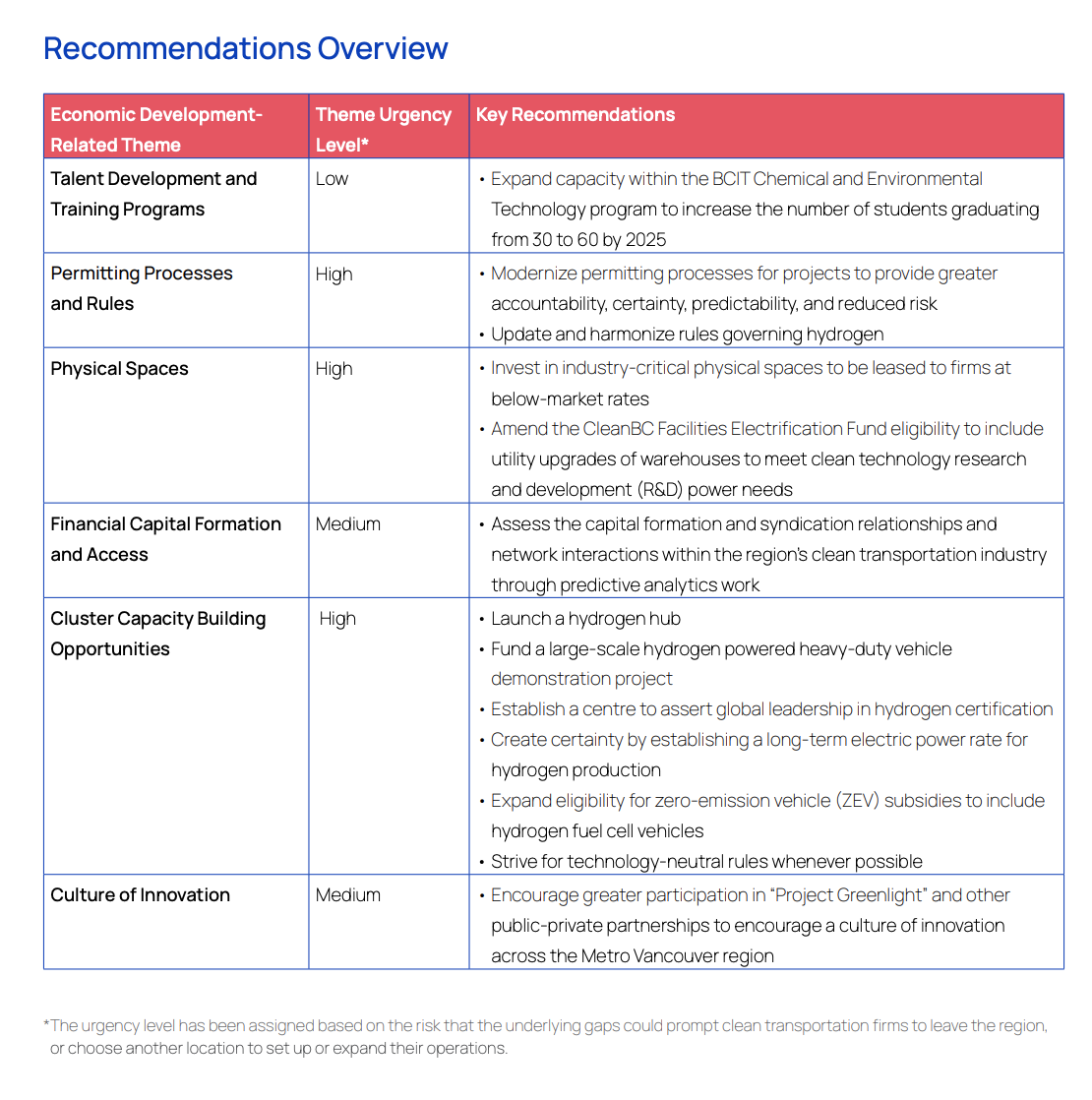
As LA County competes for up to $100 million in federal funding to develop and scale blue/green growth innovations for Southern California's goods movement ecosystem, VX News excerpts this report, prepared by Invest Vancouver—a service of the Metro Vancouver Regional District, operating in support of the Metro Vancouver regional economy—on the opportunities and challenges for advancing the region's competetiveness in the global clean transportation sector. This gap analysis examines Vancouver's robust innovation ecosystem assets, identifies urgent needs, and offers 13 recommendations for strengthening the region's clean transportation sector and position as an advanced and growing hydrogen cluster. Find the full report and recommendations online, here.
I Executive Summary
Advancements in clean transportation technologies are critical to reducing greenhouse gas emissions and addressing the ongoing climate emergency. The sector also presents an economic development opportunity, if the Metro Vancouver region can take urgent action to address obstacles faced by clean transportation firms seeking to start, locate or expand here.
The region is well-positioned for success, with a burgeoning clean transportation sector that includes strong entrants in particular niches and that has an advanced and growing hydrogen cluster. Invest Vancouver has undertaken this study as part of its work to build capacity in key industries in which the region has established and emerging industrial strengths, such as in the clean transportation sector.
The key asset in the region’s clean transportation sector is talent; firms in the sector overwhelmingly report that they are present in the region because of the access to and the leveragability of the collected knowledge and experience in the workforce. That talent is developed, supported, and supplemented by strong ties to research institutes and universities, incubators, and accelerators.
Policies that incentivize the reduction of greenhouse gas emissions are helping to create a local market in the Metro Vancouver region for clean transportation vehicles, components, and services. The firms that meet this demand, however, don’t necessarily need to be located in the region. To support a flourishing clean transportation industry, the Metro Vancouver region needs to be an attractive place for firms that have a choice about where to locate.
In the clean transportation sector as a whole, the most pressing challenges revolve around delays and uncertainty related to permitting and the general lack of available industrial land. These obstacles need to be urgently addressed as their persistence risks seeing growing, successful firms unwilling to invest further in the region or leaving entirely when they cannot find suitable space.
The region also has a unique opportunity created by the presence of firms along the entire hydrogen value chain, from supply, transportation, and storage through membranes, fuel cells, and testing. The Metro Vancouver region has an early lead in the area due, in large part,
to the presence and growth of Ballard Power Systems and the ecosystem that has developed around it. Other locations around the globe are moving forward with hydrogen; however, and the region needs to help early- and development- stage firms, particularly with the establishment of a hydrogen hub, if these firms are going to grow and thrive here.
Invest Vancouver seeks to understand two aspects of clean transportation in the Metro Vancouver region: What competitive advantages (if any) do firms in this industry enjoy by locating here? And what barriers (if any) keep the region from being a more attractive place for firms that have a choice about where to site their headquarters and operations? These questions are addressed based on primary qualitative research, consisting of interviews with chief executives (CEOs), founders, and senior executives from clean transportation firms at all stages of development and ownership types. This process led to the formulation of 13 recommendations to support a thriving clean transportation sector in the Metro Vancouver region.
Urgent needs:
• Streamline industry-relevant permitting processes
• Invest in industry-critical physical spaces
• Launch a hydrogen hub in the region
Recommendations Overview
II. Clean Transportation Overview:
The Metro Vancouver region is home to a vibrant network of emerging and mature clean transportation firms, which collectively benefit from the push to lower and eventually eliminate harmful transportation-related emissions. The sector is supported by research universities, specialized academic programs, start-up accelerators and incubators, and government policies.
Progressive municipal, regional, and provincial goals, targets, and initiatives aimed at lowering greenhouse gas emissions, particularly those from transportation, help create and sustain a local consumer market for low- and zero-emission mobility products and services. Indeed, the transition to clean transportation is well under way, with zero-emission vehicles (ZEVs) accounting for 9.4 percent of all light-duty vehicle sales in the province in 2020, the highest rate of adoption of ZEVs in North America.
Creating a local market for clean transportation, while vital to meeting climate goals, is distinct from building and scaling a clean transportation industry. More specifically, ZEVs and their components, plus the related infrastructure, fuels, and services being adopted in the Metro Vancouver region, do not necessarily need to be designed, sourced or built locally. Firms located elsewhere, whether outside of the region or the nation, can and do meet many of these needs. Supporting a clean transportation industry, therefore, begins with the recognition that firms serving global markets can choose where to site their headquarters, research and development (R&D) activities, and production facilities.
To understand how to make the region an attractive place for clean transportation firms, consider the location decisions from their point of view. What is the cost and ease of doing business? How long does it take to get permits? Is a suitable location available? How difficult is it to find skilled workers? Are there opportunities to collaborate with and to transfer technologies out of research universities? Is it easy to connect with global suppliers, partners and customers? How is the access to capital? Are there investors? How hard will it be to find initial customers, especially for innovative early-stage products? This report considers these questions and more, with the goal of identifying the challenges, roadblocks, and headaches faced by clean transportation firms in the Metro Vancouver region and recommending policies and actions to ameliorate them.
Layout and Methodology
This report seeks to understand two aspects of clean transportation in the Metro Vancouver region: What competitive advantages (if any) do firms in the industry enjoy by locating here? And what barriers (if any) keep the region from being a more attractive place for firms? Answering these questions is critical for economic development, public policy, industry and labour association, and education and workforce development decision-makers. A purely statistical approach, such as an industry contribution analysis, would provide an estimate of economic, job, and fiscal impacts of clean transportation firms, but would not address competitive advantages or barriers. Indeed, there is no quantitative approach that will zero in on the answers to these specific questions.
Instead, this report is based on primary qualitative research, consisting of interviews with chief executives (CEOs), founders, and senior executives from clean transportation firms at all stages of development and ownership types, including, in certain instances, firms that no longer exist because they were acquired, or because they folded. Invest Vancouver conducted in-depth interviews lasting from 30 minutes to more than an hour covering everything from business climate, infrastructure, physical spaces, capital, and workforce, to network organizations,
R&D, suppliers and customers. Interviewees were encouraged to discuss the production and strategic gaps they have encountered along the product / service value chain continuums, from “idea” to “export”, in this industry.
Firms were identified for inclusion using existing industry resources and relevant news articles; by suggestions from local government members of the Invest Vancouver Advisory Committee; from industry associations and their memberships; by examining and classifying job postings aggregated by Emsi Analyst; by querying the PitchBook database of firms; and by reviewing relevant company materials.
Invest Vancouver met with interviewees from almost one-third of the region’s clean transportation firms. The interviewees’ experiences and insights underpin the report findings, and have not been attributed to specific individuals or firms to encourage candid discussion. Additional information was collected in helpful discussions with: the B.C. Ministry of Energy, Mines and Low Carbon Innovation; BC Hydro; FortisBC; and the Port of Vancouver, as well as with multiple industry associations.
Unless explicitly stated otherwise, the characterization of the industry gaps, and Invest Vancouver’s recommendations for addressing them, do not represent the official policy or position of any of the firms, associations, or government entities mentioned in this report.
The report is presented in two sections. The first provides an overview of the clean transportation firms in the region, as well as the supporting assets that make it an advantage to locate, expand, hire and/or re-invest in the region. This section was prepared based on secondary research, including a literature review of previous studies supplemented with data from Emsi Analyst and PitchBook, and verified in discussions with the interviewees. The second describes the barriers preventing the region from being more attractive to clean transportation firms at different stages of firm development, and Invest Vancouver’s specific, deployable recommendations for addressing them.
…
Read the full report including Invest Vancouver’s Findings and Recommendations online, here.

